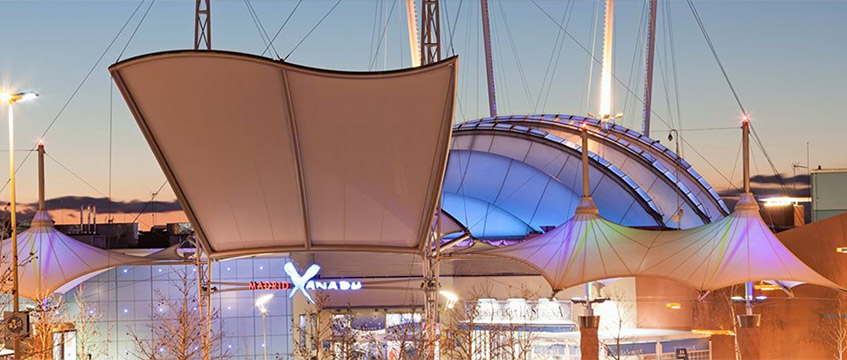Will intu’s potential Spanish sale pay off?
Intu is evaluating a number of “unsolicited” offers for its £628.8m Spanish business, as part of its overarching bid to reduce its loan-to-value ratio.
Outgoing chief executive David Fischel told EG: “Our overriding target for the business is to get LTV back below 50%.
“We have had inbound interest in Spain, so we are evaluating that interest. We have to decide on what we have to do to reduce LTV in the most shareholder-friendly way we can.”
Intu is evaluating a number of “unsolicited” offers for its £628.8m Spanish business, as part of its overarching bid to reduce its loan-to-value ratio.
Outgoing chief executive David Fischel told EG: “Our overriding target for the business is to get LTV back below 50%.
“We have had inbound interest in Spain, so we are evaluating that interest. We have to decide on what we have to do to reduce LTV in the most shareholder-friendly way we can.”
Intu’s property valuation dropped by 13.3% during the year to 31 December, with a total revaluation deficit of £1.4bn.
“We have seen quite a big yield expansion – it has been a big move for one year, so we are getting through the process,” said Fischel.
To counter this rapid decline and weakening sentiment in the retail investment market, intu is keeping hold of cash to strengthen its balance sheet.
Other measures to reduce its debt-to-assets ratio, which was 53%, included scrapping its final dividend for 2018 as well as further potential disposals, including the sale of Sprucefield Park in Northern Ireland, and a reported deal to sell 50% of intu Derby to Cale Street Partners.
A tricky sell
The Spanish assets, valued at £628.8m in the year to 31 December, are broadly considered to be the most liquid and highest quality in its portfolio, but a sale will not be straightforward.
Its Puerto Venecia centre in Zaragoza and Parque Principado centre in Oviedo are held in a joint venture with CPPIB, and its Xanadu centre in Madrid is jointly owned with Nuveen.
In all instances, the joint venture partner of the centre has a pre-emption right over Intu’s share if it is sold – meaning a quick sale without consultation will not be possible.
Furthermore, intu is the operator of these three centres. Contractually, it cannot simply leave its partners high and dry; it is obliged to find a solution for them.
This could mean the assets will probably be sold to a new partner with operational expertise, rather than just a passive investor.
It is possible that Nuveen’s Mike Sales, who has a long track record in retail, would be interested in taking on the management.
But CPPIB, which runs a lean operation with little asset management capabilities, would probably be less keen to do so.
The Costa del Sol project is a vast development, at 2.4m sq ft, and would probably appeal to a different type of buyer than those who would be interested in the standing assets.
The development also has in place a joint venture development agreement with Ian Sandford’s Eurofund Investments. Any prospective buyer would probably need to be comfortable with this arrangement.
Deal structures
Either way, a sale has the potential to take on an innovative format, away from a traditional, straightforward equity sale.
To ramp up the appeal of larger retail assets as investor appetites weaken, it appears inventive deal structures are on the rise.
These structures could involve partial equity investments that could safeguard prospective joint-venture partners from income decline through a priority share, for example.
Fischel would not comment on the extent to which the landlord might apply these to future agreements, but said: “In general terms, 70% of our assets are 100% owned. Bringing in partners and making part-disposals is a perfectly sensible strategy for us.
“In a very buoyant market, disposals will be completely clean, but – you see this in the investment market generally – when things are more difficult, people look for more rental and rent-free guarantees on particular units as a way of cutting a deal.”
REIT on
The question of whether a take-private will occur is one that is regularly asked of intu.
To amplify this, its plan to scupper its final dividend for the year – subjecting it to an estimated £19m corporation tax bill for its 2019 financial year – has caused many to wonder why it would aim to keep trading as a REIT.
However, Fischel reaffirmed the landlord’s commitment to a REIT structure and to paying the associated tax, stating: “We have said quite clearly it is our intention to remain a REIT.”
Hanging tough
Chairman of intu John Strachan told analysts that the two withdrawn takeover bids caused “disruption” and “placed a great deal of additional pressure on our management team and staff” but that, at operational level, it has stayed resilient.
“This is a very resilient business, but the board is absolutely determined we retain and generate cash to strengthen our balance sheet,” Strachan said.
Indeed, intu’s new plan of action will leave its incoming chief executive with plenty to get on board with.
There has been progress on this front. Strachan told analysts that intu was “very well advanced” with selecting a new chief executive to replace Fischel in the role – including looking at both internal and external candidates – and that the board would make a decision soon.
He went on to extend “sincere thanks” to Fischel on behalf of the landlord for agreeing to stay on for longer than planned.
To send feedback, e-mail pui-guan.man@egi.co.uk or tweet @PuiGuanM or @estatesgazette











